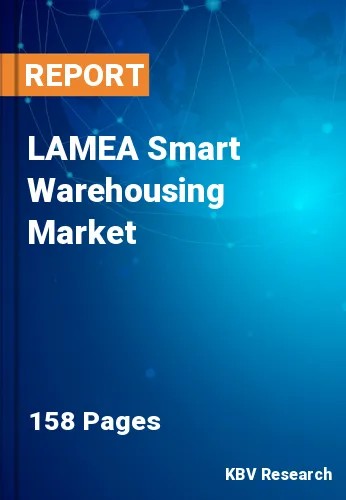The Latin America, Middle East and Africa Smart Warehousing Market would witness market growth of 16.5% CAGR during the forecast period (2022-2028).
Smart warehouses are modelled after smart plants and operate in similar information-driven environments. They combine several computerized & interconnected technologies to create a technical environment in which demands and goods can be received, organized, categorized, identified and prepared for transportation. This collaboration of innovations allows warehouse workers to increase the facility's utility, quality, and production while reducing the number of errors and reducing the number of human workers necessary. Artificial intelligence (AI), Robotics, and the Internet of Things (IoT) are heavily used in smart warehouses to allow technology to conduct tasks such as inventory management and item location.
Because of a rise in the adoption rate of process automation across multiple industrial verticals, intelligent warehouses are being installed at a rapid rate. As a result of quick visual intelligence, which simplifies the management of numerous tasks like inventory management in warehouses, these warehouses are quickly gaining traction. Operators employ these solutions to lower product damage & boost market efficiency. The implementation of these intelligent solutions is being driven by a desire to decrease corporate risk & improve warehouse service quality. Both as a service and as a product, these solutions are becoming increasingly popular. These solutions are used across a variety of industries, including manufacturing, retail, healthcare, and transportation.
The United Nations has been working toward Sustainable Development Goal 7 (SDG7) since 2015, which aims to make sure that everyone in the world has access to affordable, dependable, sustainable, and modern energy. SDG7 is especially important for Sub-Saharan Africa, where a majority of the population lacks access to reliable sources of power. This developing economy is attempting to obtain investment, which is one of the major reasons, due to which, warehousing in Ghana, Mozambique, and Cote d'Ivoire requires 24-7 electricity and internet. Companies doing business in Sub-Saharan African countries like Ghana, Mozambique, and Côte d'Ivoire require reliable power to assist their logistics. Organizations want reliable digital connectivity as they embrace automated solutions & use data to drive their operations. In today's supply chain & warehouse management, electricity and the internet are dependent of each other. Due to this, warehousing in Mozambique, Ghana, and Cote d'Ivoire requires 24-7 electricity and communication.
The Brazil market dominated the LAMEA Smart Warehousing Market by Country in 2021, and would continue to be a dominant market till 2028; thereby, achieving a market value of $743.7 million by 2028. The Argentina market is poised to grow at a CAGR of 17.1% during (2022 - 2028). Additionally, The UAE market would witness a CAGR of 16.2% during (2022 - 2028).
Based on Deployment Mode, the market is segmented into On-premises and Cloud. Based on Technology, the market is segmented into Automated Guided Vehicles (AGV), IoT & Analytics, RFID, AI in Warehouse, Blockchain & Others. Based on Application, the market is segmented into Transport Management, Inventory & Order Management, Yard & Shipping Management, Labour Management, and Others. Based on Component, the market is segmented into Hardware, Solution (Warehouse Management Systems and Warehouse Control Systems & Others), and Services. Based on Organization Size, the market is segmented into Large Enterprises and Small & Medium Enterprises (SMEs). Based on Vertical, the market is segmented into Transportation & Logistics, Retail & Consumer Goods, Automotive, Government, Healthcare & Life Sciences, Manufacturing, Mining, Food & Beverages, and Others. Based on countries, the market is segmented into Brazil, Argentina, UAE, Saudi Arabia, South Africa, Nigeria, and Rest of LAMEA.
Free Valuable Insights: The Global Smart Warehousing Market is Predict to reach $29 Billion by 2028, at a CAGR of 11.2%
The market research report covers the analysis of key stake holders of the market. Key companies profiled in the report include IBM Corporation, Oracle Corporation, SAP SE, Infor, Inc., Softeon, Körber AG, Manhattan Associates, Inc., PTC, Inc., Tecsys, Inc., and Epicor Software Corporation.
By Deployment Mode
By Technology
By Application
By Component
By Organization Size
By Vertical
By Country
Our team of dedicated experts can provide you with attractive expansion opportunities for your business.

